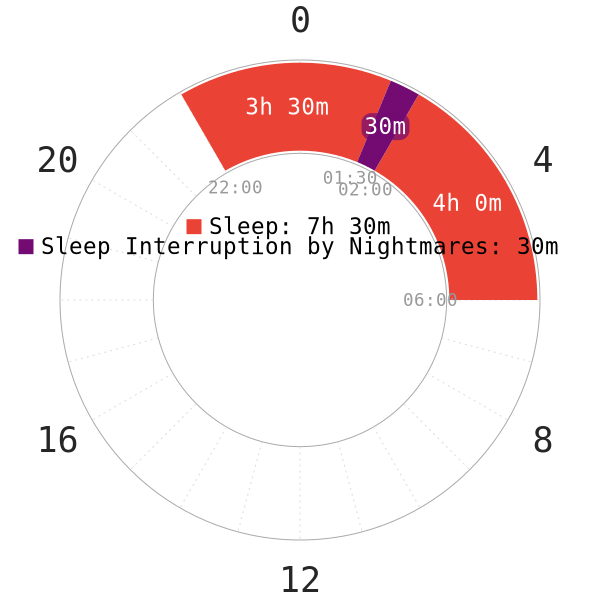DISCLAIMER
This blog focuses on anecdotal evidence and in-depth personal experience of a longtime polyphasic sleeper. There is also some reflection on nightmare incidents before and during the polyphasic journey. Some scientific data in this blog post is for reference and set up basis for certain claims. More research on polyphasic sleep’s physical and mental effects and nightmare occurrences is mandatory to determine if polyphasic sleep generates more or less nightmares.
Introduction
Nightmares are usually unpleasant occurrences during our sleep. During our lifetime, the vast majority of us go through at least some nightmares in one way or another. There are a lot of depictions for how nightmares sound or look like or what directly causes them; however, their cause has not been fully understood.

The generic consensus is that it evokes intense, horrifying or in the worst cases, disgusting imagery during dreams. These would often result in sleep interruptions. The sleeper then wakes up and recalls the nightmare with intense reactions such as sweating in some cases, and feels uneasy or fearful sometimes.
Mechanics of nightmares
To gain a clearer insight into how it works, it is necessary to know what potentially causes it.
- The most nerve-wracking finding is that nightmares can occur in any sleep stages, ranging from NREM2 to REM sleep, where it is common to recall vivid dreams.
- This makes it very difficult to statistically determine if nightmares only occur during REM sleep or during any other sleep stages.
Factors that can contribute to more nightmares include:
- Desynchronized sleep
- Drug use
- Genetics
- Mental conditions such as schizophrenia.
Environmental factors such as constant stress, PTSD-like events can also drastically affect personal experience. Those that have lifelong nightmares also tend to run into more of them. Psychotic patients have reported to encounter nightmares on a more regular basis than healthy individuals1. One of the more important factors is that insomnia also plays an important role in increasing nightmare frequency.
Nightmares in polyphasic sleep
Polyphasic sleeping centers on maximizing sleep efficiency. Mechanistically, it focuses on quality sleep and getting enough REM and SWS for optimal body functions. It may or may not provide any extra wake hours depending on scheduling. However, until that point, an adaptation process needs to be complete before sleep architecture can stabilize. The rigidity of sleep times is effective in helping the body learn the waking and sleeping hours each day.
Over time, the distinction becomes clearer and the body automatically knows when resting and waking times are. Notably, there has been some postulation on the correlation between insomnia and the frequency of nightmares2. Although not entirely concrete, it was a reasonable statement for assessment of how polyphasic lifestyle can help reduce the amount of nightmares.
Personal experience
“During my 5 years of polyphasic sleeping, I have adapted to a wide array of schedules in the system. However, I barely ran across any nightmares. While I was on monophasic sleep and up until the first time I practiced polyphasic sleeping, I ran into a lot of nightmares. They occurred up to a few each month.
Granted, it was not that monophasic sleep was the worst type of sleep for me; it was more about my chaotic sleep times during teenage years as well as sleep deprivation during school. I figure this is also a common phenomenon in teenagers. In addition, I noticed that I had more headaches that occurred at least once a week with different intensities. I also experienced mental fatigue and lack of productivity with subpar quality sleep.
During polyphasic sleep, not only do I manage my waking hours better but I also had close to zero nightmares. I think that having a stable circadian rhythm is very important to not confuse the body. Messy sleeps sound more unhealthy if left unchecked. Given that insomnia has something to do with nightmares, unstable and broken sleep architecture can give rise to insomnia and more nightmares.
On a polyphasic sleep regime, I also learn to fall asleep very quickly depending on schedules. Overall, a lot faster than on monophasic sleep. By controlling my sleep on a daily basis, I think it is a very healthy thing to do for my body. And even though healthy sleep is definitely a subjective matter, I now found the best sleeping regime to avoid those pesky bad dreams.”
-GeneralNguyen
What do other polyphasic sleepers say?
Before the making of this blog post, 17 experienced dreamers in the polyphasic sleep community were asked about their experiences with nightmares during or after their polyphasic adaptations.
- All of them claimed that bad dreams occurred more frequently; however, it is not the same for nightmares.
- The exposure to nightmares also seems to be independent of sleep deprivation. Even during adaptation, these sleepers did not recall full-blown nightmares that left any strong impressions on them.
- Around half of the surveyed polyphasic sleepers have adapted to at least one polyphasic schedule.
- The remaining number did not manage to adapt to any polyphasic schedules.
Is polyphasic sleeping worth it?
“Yes. To me, at the very least I can comfortably sleep without ever worrying about nightmares. All the while I can still enjoy horror materials like movies and clips. I figure that polyphasic sleeping by itself might not help with nightmares at all.
The more well-rounded approach to prevent nightmares would be to have consistent sleep times, or at the very least, consistent sleep window. Focus on good sleep hygiene such as blue light filtration during nighttime, a balanced nutritional diet and some exercising.”
– GeneralNguyen
Main author: GeneralNguyen
Page last updated: 28 December 2020
Reference
- Murray, J. B. “Psychophysiological Aspects of Nightmares, Night Terrors, and Sleepwalking.” The Journal of General Psychology. 1991;118(2):113–127. doi: 10.1080/00221309.1991.9711137. [PubMed]
- Wong, Maria M., et al. “Sleep Problems, Suicidal Ideation, and Self-Harm Behaviors in Adolescence.” Journal of Psychiatric Research. 2011;45(4): 505–511. doi: 10.1016/j.jpsychires.2010.09.005. [PubMed]
